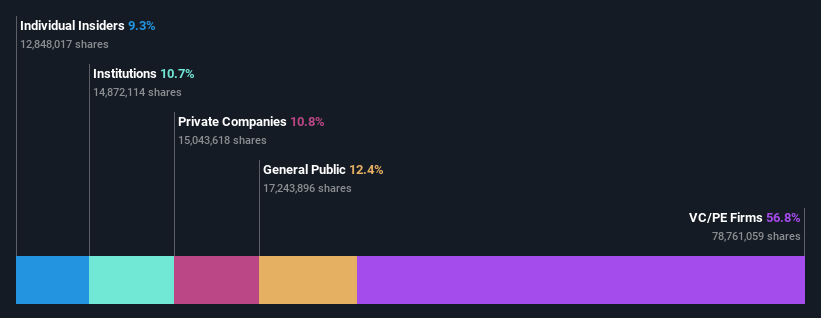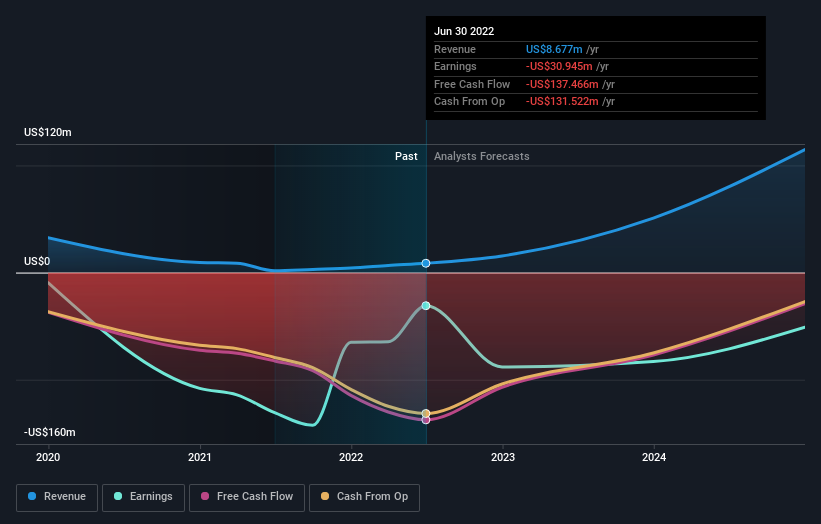Private equity firms in Pear Therapeutics, Inc. (NASDAQ:PEAR) are its biggest bettors, and their bets paid off as stock gained 26% last week
To get a sense of who is truly in control of Pear Therapeutics, Inc. (NASDAQ:PEAR), it is important to understand the ownership structure of the business. We can see that private equity firms own the lion's share in the company with 57% ownership. In other words, the group stands to gain the most (or lose the most) from their investment into the company.
As a result, private equity firms were the biggest beneficiaries of last week’s 26% gain.
Let's delve deeper into each type of owner of Pear Therapeutics, beginning with the chart below.
Check out our latest analysis for Pear Therapeutics
What Does The Institutional Ownership Tell Us About Pear Therapeutics?
Institutional investors commonly compare their own returns to the returns of a commonly followed index. So they generally do consider buying larger companies that are included in the relevant benchmark index.
As you can see, institutional investors have a fair amount of stake in Pear Therapeutics. This suggests some credibility amongst professional investors. But we can't rely on that fact alone since institutions make bad investments sometimes, just like everyone does. When multiple institutions own a stock, there's always a risk that they are in a 'crowded trade'. When such a trade goes wrong, multiple parties may compete to sell stock fast. This risk is higher in a company without a history of growth. You can see Pear Therapeutics' historic earnings and revenue below, but keep in mind there's always more to the story.
Pear Therapeutics is not owned by hedge funds. The company's largest shareholder is Temasek Holdings (Private) Limited, with ownership of 19%. In comparison, the second and third largest shareholders hold about 13% and 8.7% of the stock. Furthermore, CEO Corey McCann is the owner of 7.8% of the company's shares.
On looking further, we found that 57% of the shares are owned by the top 5 shareholders. In other words, these shareholders have a meaningful say in the decisions of the company.
While it makes sense to study institutional ownership data for a company, it also makes sense to study analyst sentiments to know which way the wind is blowing. There are a reasonable number of analysts covering the stock, so it might be useful to find out their aggregate view on the future.
Insider Ownership Of Pear Therapeutics
While the precise definition of an insider can be subjective, almost everyone considers board members to be insiders. Management ultimately answers to the board. However, it is not uncommon for managers to be executive board members, especially if they are a founder or the CEO.
I generally consider insider ownership to be a good thing. However, on some occasions it makes it more difficult for other shareholders to hold the board accountable for decisions.
We can report that insiders do own shares in Pear Therapeutics, Inc.. It has a market capitalization of just US$296m, and insiders have US$27m worth of shares, in their own names. Some would say this shows alignment of interests between shareholders and the board. But it might be worth checking if those insiders have been selling.
General Public Ownership
The general public, who are usually individual investors, hold a 12% stake in Pear Therapeutics. While this group can't necessarily call the shots, it can certainly have a real influence on how the company is run.
Private Equity Ownership
With an ownership of 57%, private equity firms are in a position to play a role in shaping corporate strategy with a focus on value creation. Some investors might be encouraged by this, since private equity are sometimes able to encourage strategies that help the market see the value in the company. Alternatively, those holders might be exiting the investment after taking it public.
Private Company Ownership
We can see that Private Companies own 11%, of the shares on issue. It's hard to draw any conclusions from this fact alone, so its worth looking into who owns those private companies. Sometimes insiders or other related parties have an interest in shares in a public company through a separate private company.
Next Steps:
While it is well worth considering the different groups that own a company, there are other factors that are even more important. Like risks, for instance. Every company has them, and we've spotted 4 warning signs for Pear Therapeutics (of which 1 is a bit concerning!) you should know about.
But ultimately it is the future, not the past, that will determine how well the owners of this business will do. Therefore we think it advisable to take a look at this free report showing whether analysts are predicting a brighter future.
NB: Figures in this article are calculated using data from the last twelve months, which refer to the 12-month period ending on the last date of the month the financial statement is dated. This may not be consistent with full year annual report figures.
Have feedback on this article? Concerned about the content? Get in touch with us directly. Alternatively, email editorial-team (at) simplywallst.com.
This article by Simply Wall St is general in nature. We provide commentary based on historical data and analyst forecasts only using an unbiased methodology and our articles are not intended to be financial advice. It does not constitute a recommendation to buy or sell any stock, and does not take account of your objectives, or your financial situation. We aim to bring you long-term focused analysis driven by fundamental data. Note that our analysis may not factor in the latest price-sensitive company announcements or qualitative material. Simply Wall St has no position in any stocks mentioned.
Join A Paid User Research Session
You’ll receive a US$30 Amazon Gift card for 1 hour of your time while helping us build better investing tools for the individual investors like yourself. Sign up here

 Yahoo Sport
Yahoo Sport 








































